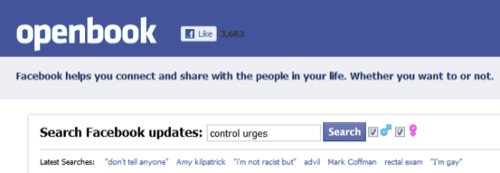Facebook CEO Mark Zuckerberg penned a public statement about Facebook privacy issues and what’s being done about that issue by way of an article published in today’s Washington Post. In the brief, carefully crafted mea culpa, Zuckerberg addresses the ongoing privacy backlash the site is now facing: “We just missed the mark,” he wrote, referring to the overly complex, granular privacy settings and controls that offer toggles for everything from search engine visibility to whether or not your photo albums can be seen by your boss.

What wasn’t addressed, however, was why the need for clearer, easier-to-use privacy settings became such an urgent matter in the first place. And that is at the core of Facebook’s steamroller approach to forcing people into public sharing, a corporate philosophy that seems less about impact to its bottom line and more about fulfilling Zuckerberg’s personal vision for a more social Web: “If people share more, the world will become more open and connected,” he writes in the article. “And a world that’s more open and connected is a better world.”
New Privacy Settings Coming
If we take a big-picture view of the issue at hand, an “open and connected” world may indeed be a better one. But in the harsh light of everyday reality, the situation isn’t as rosy. As social media researcher danah boyd (yes, lower case is how she writes her name) notes in a recent blog post, “Zuckerberg doesn’t know how to resolve the positive (and in his head inevitable) outcomes of transparency with the possible challenges of surveillance.” Taking it to the extreme, she points to an example of the dangerous outcomes: “When a father in Saudi Arabia caught his daughter interacting with men on Facebook, he killed her.” (The example was pulled from the upcoming book, “The Facebook Effect,” by David Kirkpatrick, an inside account about Facebook’s creation.)

But you don’t have to go that far to see the potential dangers of an over-sharing user base who thinks they’re penning short missives that will only be read by a closed group of friends. For example: these people are talking about doing the drug salvia, these people prefer smoking pot, these women are cheating on their husband (or are being cheated on by him), these people hate their boss, these people just came out of the closet, these people hate gays, these people are either joking or serious about being an alcoholic, these people are taking an HIV test, and so on. (Click through on those links and you’ll find full names and photos to accompany each status update. We won’t publish specific examples here, however).
Outside of a handful of exhibitionists, the people cited above likely believe what they’re sharing is private. They are mistaken.
And what will easier privacy settings do for these people, these, the unconcerned mainstream masses that are the bulk of Facebook’s 400-plus million active users? The answer is nothing because they don’t even know their privacy is being violated to begin with.
They don’t know the recommended settings Facebook prompted users to accept starting late last year made everything of consequence public from status updates to photos. They don’t know that their likes are now public. They don’t know that their thoughts are indexed by new, public-facing search engines like OpenBook, OneRiot and Booshaka.
And they won’t care until something bad happens. Bad, as in “losing one’s job, losing one’s health insurance, losing one’s parental rights, losing one’s relationships, etc.” writes boyd, offering more down-to-earth suggestions of potential damages.
Missing the Point: Damage Has Been Done
To those who don’t follow privacy issues on Facebook closely, the Zuckerberg letter appears to address the issue well enough – Easier privacy tools are coming? Great! – but that misses the point.
What’s more important is what’s not being said.
Reading between the lines, it’s clear that Facebook is not rolling back any of its previous changes. It’s not resetting people’s profiles to “private”; it’s not switching off the “instant personalization” feature; it’s not changing to an opt-in model.
And while Facebook won’t confirm that this is the case, (on the record, that is), it’s obvious to anyone who’s clued in to Facebook’s overall agenda what’s going on here: Zuckerberg will have his way. He will see his vision realized.
At the end of day, the net effect of all this “openness” may, in fact, be a better world. But getting there will be hard, and people’s lives may be damaged in the process. Do those affected have only themselves to blame for putting thoughts online that should have remained in their heads? Perhaps. But Facebook once told its users it was a safe place to share these things.. .and sadly, many people believed that was true.





















